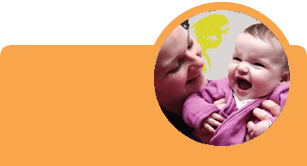
There is a wide variation in when children begin to use single words. This can happen around the age of 12-18 months.
First of all, your child must learn to:
- listen
- understand
- remember
- take turns
Then your child will be ready to try saying words.
Children need to hear words over and over again before they can begin to understand and use them. They will understand more than they can say to begin with.
Children often begin by using words to do with toys, food, animals or people they are interested in. Follow their interest and focus on words that they find motivating.
Point at and name familiar things during play and in everyday situations. Use gestures to help them e.g. holding your hands palms up to indicate “all gone”.
- Beep beep: say this when you play with toy cars or when walking along the road.
- Quack quack: talk about ducks in a book; feed the ducks at your local pond.
- Hello/Bye: talk on a toy telephone; encourage your child to wave bye-bye to Granny.
- Again: ask your child if he wants a favourite game again e.g. tickles, bubbles, tower of bricks.
- Up: say this when lifting your child out of their cot or when going upstairs.
- All gone: hide toys under a blanket; or say this when your child finishes their dinner.
Say a word and wait – give your child time to try and copy it.
Sometimes your child may not say a new word. It is important not to put your child under pressure by insisting they attempt a word.
Build up your child’s confidence by encouraging any word attempts. Don’t worry if your child’s words are not very clear to begin with. When you think you’ve heard a word assume you have and repeat it e.g. “na”; “yes, banana”.
Help your child by giving them a choice. This allows them to hear the words first and make an attempt to reply e.g. “Do you want milk or water?”
Give your child lots of praise for trying to say a word.
Remember children develop at different rates. If you have any queries regarding your child’s development please speak to your Health Visitor or contact your local Speech and Language Therapy department here.




